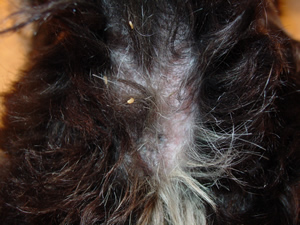Fleas are more than an itchy nuisance for your dog and cat. Fleas play a crucial role in bringing tapeworm to your pets. Here’s how it works…
The tapeworm that is transmitted by fleas lives in the dog’s or cat’s intestines. It has mouth suckers and thorn-like hooks to help it stay in place. It feeds by absorbing nutrients from the fluid around it.
The tapeworm is made of stacked egg-filled segments. These break off one at a time and pass out the intestine when the animal defecates. These can be seen as dried-out “rice grains” in your pet’s bedding.
Unfortunately, this is the same place that flea eggs are likely to hatch. Flea larvae are voracious feeders. While their normal food is flea feces, they won’t hesitate to eat a tapeworm segment.
When this happens, the tapeworm begins its development inside the flea. By the time the flea is an adult, the tapeworm is ready to infest the next host.
As the flea sucks blood, the dog or cat may lick it off and eat it. Inside the animal’s stomach, the flea is digested, releasing the tapeworm. The worm is carried to the small intestine where it starts its life cycle all over again.
We have effective medications that can eradicate tapeworms, as well as other worms.
Can a person be infected the same way? Yes. Of course, you need to swallow an infested flea.
Dr. Louise Janes D.V.M. & Dr. Jeff Grognet D.V.M
 Mid-Isle Veterinary Hospital
Mid-Isle Veterinary Hospital
5-161 Fern Road West
Qualicum Beach, BC
Tel (250) 752-8969
See all articles by Dr. Louise Janes D.V.M. & Dr. Jeff Grognet D.V.M.




